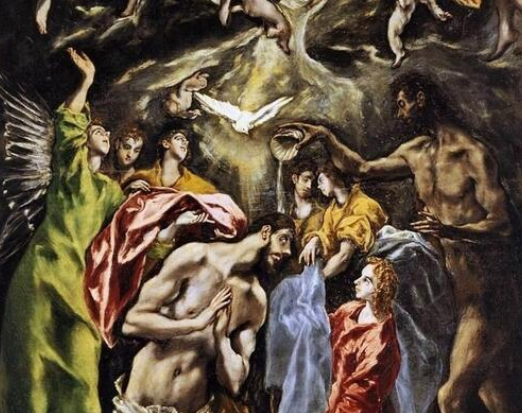In the tapestry of human history, few threads have been as persistent and influential as religion. As we navigate the complexities of the 21st century—with its scientific breakthroughs, technological wonders, and shifting social paradigms—we find ourselves at a critical juncture where ancient beliefs meet modern understanding. Whether you approach this text as a believer, skeptic, or somewhere in between, hopefully you will find value in this contemplation of humanity’s oldest relationship: the one we have with the divine and the questions that continue to transcend time.
Author: Elsa Godinho de Matos
Religion and God are concepts that have been in our Western society for a long time. They have become a part of our daily life, from buildings we see on the street to phrases we use, passing by every history textbook. While we cannot deny they once played an essential role in History and shaped our culture, do we truly still need a God? Or do we keep holding on to religion out of habit?
Before diving into the answers to this question, the concept of “God” must first be defined. According to the Cambridge Dictionary, a God is, “a spirit or being believed to control some part of the universe or life and often worshipped for doing so.” Most cultures, throughout space and time, have had different divinities, with various functions and levels of alleged influence on the world.
Thousands of authors have discussed the question of religion in various ways, as it is a complex and subjective theme. It would take a lifetime to thoroughly explore every aspect of this matter, and it is important to keep in mind that there are many ways to answer this question.
One of the reasons why God once seemed so essential in our society, is that he could guarantee that what we perceive is real. According to Descartes, there could be an evil spirit deceiving us, making it impossible for us to trust empirical sensations. However, if there is a God, that cannot happen. Since the God is perfect, it cannot be deceitful. Descartes proves the existence of God by saying that, in short, the concept of a perfect being such as God can only have been created by a perfect being. We could not conceive God and question its existence if it did not exist. So God exists, and guarantees that what we take for reality is not a mere illusion. That is quite reassuring. No one likes to think that we might be living in a simulated reality, being controlled by some sort of aliens.
But is God the only way we can trust our senses? For Hume, a Scottish empiricist from the 18th century, religion is simply a matter of faith and opinion, and the existence of God cannot be proven. He believes that reality is only what we perceive with impressions or sensations. However, he does not solve the possibility of Descartes’ evil spirit deceiving us.
Luckily, there are also some more balanced points of view. Stephen Hawking, a famous theoretical physicist, uses the example of a goldfish to illustrate that everything is a matter of perspective. He asks the reader to imagine goldfish in a round aquarium observing the motion of objects outside the bowl. He says that, “the goldfish could formulate scientific laws from their distorted frame of reference that would always hold true”. Although the goldfish’s laws are different from those we would conceive of, they are still true. This shows that knowledge can be subjective, yet still true. This might seem strange, but when we think about it, uncertainty is widely accepted in the scientific community. For example, Heisenberg’s famous uncertainty principle states that we cannot know for sure the speed and location of a quantum particle. So, if physicists can accept that some things are not certain, only probable, we can accept that it is credible that reality is such as we perceive it, even if we do not have a God to guarantee that.
In many societies, divinities could explain things that humans couldn’t understand, such as the beginning and workings of the universe. That is also the case with monotheist religions and creationism. Nowadays, knowing that we can trust empirical knowledge, science can answer these questions without referring to God. When Napoleon confronted Laplace on the fact that his book about the universe’s workings did not mention its creator once, he replied, “I had no need for that hypothesis.” Indeed, the Big Bang theory is now the most accepted theory explaining the creation of the universe, and it does not require God.
Still, many people, amazed by the fact that the world is perfectly able to sustain human life, believe that it was created by God for our benefit. It does seem strange that the laws of the universe are such that stars can create carbon atoms and other particles essential for life. If some constants had been slightly different, life as we know it would not have existed anywhere in the universe. But that is not a coincidence. It is easy to understand why, in the Solar system, human life has only developed on Earth: it is the only planet at a suitable distance from the Sun. If the Earth had been a little closer or farther away from the star, we would not be here. Stephen Hawking tried to apply that idea on a bigger scale. Perhaps there is a multitude of universes, each with a different set of laws. Our universe has laws that permit life to develop. If we are here today, observing this universe, it is for the same reason we are on this planet; it is the only place where we could survive.
It is possible to link this idea to Darwin’s theory of evolution. The Earth and the species that inhabit it were not created for us, to perfectly suit our needs. We are here because we evolved so that our needs perfectly fit what the Earth has to offer.
So far, we have seen that, from a practical point of view – that is, in terms of epistemology and science – God is not essential, or at least not anymore. But those are not the only reasons God and religion feel so necessary. Religion can guide people in life; it is used as an indication of what is right and wrong, a motivation to be good. If pure kindness is not enough, the prospect of the peace and rest found in Heaven should be a good reason to behave. In a way, this would mean humans are not inherently good. But what happens if we are? Would that mean we do not need religion to motivate us to be nice? Locke, a British philosopher from the 17th century, says humans are naturally good since there are natural laws that they follow to avoid chaos. Yet he adds that those laws are of divine inspiration. Either way, it seems that morality is deeply linked with religion.
This is a bit hard to believe, though. If so many crimes and cruel acts have been committed in the name of God, surely religion cannot guarantee morality. In addition to that, values adopted by religion (such as the love for others and other things considered morally correct) have been absorbed by society. A lot of children are taught to be nice and to respect everyone. Even if they grow up to be atheists, they keep these values. This shows that we do not need God to be good. In fact, God and religion do not seem to play a relevant role in morality.
On the other hand, for many people, God gives meaning to life; once again through the possibility of an afterlife. What happens if God is removed from the equation? According to Nietzsche, the well-known 19th century philosopher, this would lead to a lack of purpose. That’s what he tries to explain with his famous quote, “God is dead”. Modern society does not need God anymore, which leads to a dangerous kind of nihilism. But is that true? Is religion the only way to find meaning in life?
According to the Danish philosopher Kierkegaard, it is. He argues that fulfilment and sense in life are found through the “leap of faith”: a complete surrender and trust in God. Other existentialists, such as Sartre, have an opposing point of view, believing that everyone creates their own meaning through their actions. Camus has a more extreme opinion. For him, life is absurd and has no meaning. We must accept this fact, and enjoy life regardless. According to him, religion is merely a way of escaping absurdism – a philosophical suicide.
Finally, we must not forget that, at the end of the day, humans are animals. We cannot escape biology and the theory of evolution, according to which our purpose is to reproduce and perpetuate the species. It is needless to say, neither existentialism nor science require God to answer the question of the meaning of life.
God is not necessary to determine what is real, nor to explain how the universe works. It is not essential either to guarantee morality and meaning in life, although it is true that, for some people, God can have some impact on those issues. Nevertheless, it really seems as though we don not need a God anymore. So why do so many people still hold on to religion? History and culture are undeniably a reason. But perhaps there is something else. Perhaps humans need some kind of faith or spirituality, something to give them hope and hold on to. In difficult times, we need something to believe in when nothing else seems to work. We always have and always will make up something to feel less lost and insignificant in this vast, dark, empty universe.
Edited by: Hedvig Paulander
Cover image: Baptism (1614) by El Greco



